#which may help a bit? also in language learning in particular it may be useful for tools that highlight the word being Read Aloud?
Explore tagged Tumblr posts
Note
hey my guy, didnt mean to talk shit about lack of brevity - it was meant as a like semi affectionate ask for line breaks.
I want to read your post! It is not too long!! But my brain is Dying. dyslexia is turning everything to mush the second i get five lines into your para.
(semi affectionate bc you are a stranger to me but i do vibe with your language learning goals? parasocial blablabla?? hopefulyl you feel me)
I feel you. <3 I will try to break those huge paragraph chunks a bit more, I'll think a bit. Part of it is that I try to write some posts as numbered lists where a numbered item has to be 1 paragraph even if it gets long. Then it DOES get long since I only have 1 paragraph to do it, then it gets so long I turn it into Regular Text instead of Numbered List format. Then it's just huge paragraphs from when I was trying to squeeze it into a numbered list format.
Maybe an alternative could be sections with headers or capital letter titles or in bold, to separate things. Instead of numbered lists. Then it would be easier for me to split sections into multiple parapraphs possibly. Again I will think on it. Apologies in advance though for the blocks of text I'll inevitably post at times. I just kinda end up writing long rambling a lot when I'm trying to jot down ideas (as seen by my horrifically long tags and main blog fandom bullshit lol sjdjjd)
Tldr: I'll try maybe more header titles bolded or capitalized or on their own line, to break up sections. Then maybe I'll be able to add more paragraphs without it being hard to locate which section is which. While having maybe a bit more line breaks hopefully.
#replies#ask#also i will look up today if theres idk any useful tools? that might also be applicable to language learning#like. i remember there being some fonts/extensions on firefox and chrome to color certain words or be more readable#which may help a bit? also in language learning in particular it may be useful for tools that highlight the word being Read Aloud?#Microsoft Edge does highlight the word its on in Read Aloud mode which is why i like it so much with reading chinese and japanese#but also :/ unfortunately im not sure. i have adhd but that affecfs my reading more like#i just Cant read more than 100 words in an hour some months. i just keep rereading and reading extremely slowly and forgetting what i read#then other months i can read and try to do most of my reading on those months. so its not the text being hard to parse#so much as my attention struggling to remember things literally right in front of me idk idk ajsjdj i dont know shit on this
0 notes
Text
Eight Strategies for Improving Dialogue in Your Writing
Well, hi! Oh my… wow! It’s been a long time since I’ve posted! I’ve been very busy and I am genuinely sorry to all my followers, but that doesn’t mean I’ve forgotten about this account, but here is one final post for the year!
Hopefully next year I become consistent with it again!
Let’s begin!
One of the best ways to help a reader connect with your writing is by crafting excellent dialogue. Use these tips to learn how to write dialogue that showcases character development, defines your characters’ voices, and hooks readers.
Why Use Dialogue?
Good dialogue performs all sorts of functions in fiction writing. It defines your characters’ voices, establishes their speech patterns, exposes the inner emotions, and showcases their character development. Beyond mere characterization, effective dialogue can also establish the setting and time period of your story and reveal information in a way that doesn’t feel overly expository.
Authors use lines of dialogue to reveal a character’s personality and express their point of view. For instance, an archetypal football coach might speak in short, terse sentences peppered with exclamation points and quotations from famous war generals. By contrast, a nebbish lover with a broken heart might drone on endlessly to his therapist or best friend, speaking in run-on sentences that circle around his true motivations. When an author can reveal character traits through dialogue, it cuts down on exposition and makes a story flow briskly.
Eight Writing Tips for Improving Dialogue
The first time you write dialogue, you may find it quite difficult to replicate the patterns of normal speech. This can be compounded by the concurrent challenges of finding your own voice and telling a great story overall. Even bestselling authors can get stuck on how a particular character says a particular line of dialogue. With practice and hard work, however, lackluster dialogue can be elevated to great dialogue.
Here are some strategies for improving the dialogue in your own work:
Mimic the voices of people in your own life. Perhaps you’ve created a physician character with the same vocal inflections as your mother. Perhaps your hero soldier talks just like your old volleyball coach. If you want to ensure that your dialogue sounds the way real people speak, there’s no better resource than the real life people in your everyday world.
Mix dialogue with narration. Long runs of dialogue can dislodge a reader from the action of a scene. As your characters talk, interpolate some descriptions of their physical postures or other activity taking place in the room. This mimics the real-world experience of listening to someone speaking while simultaneously taking in visual and olfactory stimuli.
Give your main character a secret. Sometimes a line of dialogue is most notable for what it withholds. Even if your audience doesn’t realize it, you can build dynamic three-dimensionality by having your character withhold a key bit of information from their speech. For instance, you may draft a scene in which a museum curator speaks to an artist about how she wants her work displayed—but what the curator isn’t saying out loud is that she’s in love with the artist. You can use that secret to embed layers of tension into the character’s spoken phrases.
Use a layperson character to clarify technical language. When you need dialogue to convey technical information in approachable terms, split the conversation between two people. Have one character be an expert and one character be uninformed. The expert character can speak at a technical level, and the uninformed one can stop them, asking questions for clarification. Your readers will appreciate it.
Use authentic shorthand. Does your character call a gun a “piece” or a “Glock”? Whatever it is, be authentic and consistent in how your characters speak. If they all sound the same, your dialogue needs another pass.
Look to great examples of dialogue for inspiration. If you're looking for a dialogue example in the realm of novels or short stories, consider reading the great books written by Mark Twain, Judy Blume, or Toni Morrison. Within the world of screenwriting, Aaron Sorkin is renowned for his use of dialogue.
Ensure that you’re punctuating your dialogue properly. Remember that question marks and exclamation points go inside quotation marks. Enclose dialogue in double quotation marks and use single quotation marks when a character quotes another character within their dialogue. Knowing how to punctuate dialogue properly can ensure that your reader stays immersed in the story.
Use dialogue tags that are evocative. Repeating the word “said” over and over can make for dull writing and miss out on opportunities for added expressiveness. Consider replacing the word “said” with a more descriptive verb.
941 notes
·
View notes
Text
Dead lander Hoaxe AU
Post the first out of... idk. Two at least, probably more. I'm 99% sure this has been done before by somebody but I haven't really seen it over here, so I have no idea, lol. At any rate the details are probably different XD
Basic premise? What if Hoaxe just... never left the Dead Lands? What if he never got cornered by dead landers, or crushed by the crystal, and continued to grow up and eventually matured in the Dead Lands, and was in the process hardened into a skilled survivalist?
Does this have plot consequences? Yes. Many. I have tried to patch things up into a more or less interesting alternative, but also. Many holes. Does it actually work just by the canonical laws of the game? I... don't really know, but probably not? This post will mostly be about Hoaxe rather than the plot. Anywho:
The wet cat himself:
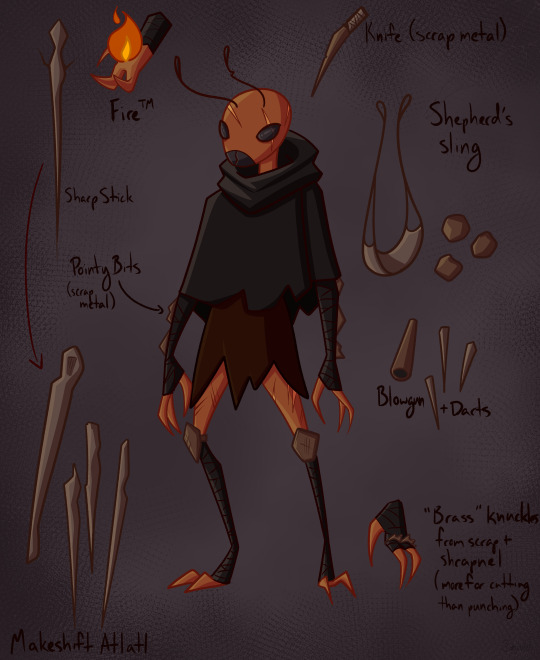
(Granted, in this AU he is significantly less of a wet cat, but shhhh.)
Some basics about Hoaxe:
The fire magic - he does still have his fire magic, he just got it differently. He didn't get squashed by a crystal, but he's been around them a whole lot and has by consequence picked up (much more stable) fire magic from it. He also practices using it a lot more, and becomes quite skilled with it. He mostly uses it for cooking, though - larger, flashy fires can draw a lot of... unwanted attention.
I think the devs mentioned somewhere that Bugnish needs to be taught, so Hoaxe never really learns it. He doesn't talk much, and on the rare occasions he needs to communicate, he does so in gestures and non-verbal vocalizations. He takes notes in a logographic format. He does pick up a few words from the Roaches, some in Bugnish, some in Roach language (when he eventually finds the Roach village).
He does take notes, as mentioned above - usually charcoal on either dead lander shell, rock, or any other available writing surface. Usually, it's notes about the dead landers themselves, other local flora and fauna, and mapping out the area. Hazards, good food sources, safe places, dangerous places, hot spots for different dead landers, all that.
As far as the Roaches are concerned, Hoaxe is this... local, very occasional drifter. He drops by sometimes with interesting finds or notes and trades with them and rests while he's there. Over time, he becomes a local guard of sorts, helping keep dead landers away from the village and even sorta assisting with guarding the sapling, insofar as it needs it.
The Roaches have noticed that despite the residual crystal magic around him, he doesn't seem to react to the sapling vault. Some of them have wondered if its magic has faded, or if Hoaxe just isn't bothered.
Hoaxe accrues a few different weapons for taking care of himself, most of them ranged. He has a sling - think shepherds sling - which he uses to send rocks flying at mach-screw-you-in-particular straight into dead landers' faces. A similar premise applies to his blowgun and darts, and assorted sharpened sticks paired with a notched branch - a makeshift atlatl.
Hoaxe has an iron stomach in so many respects. He has also figured out how to cook most things into a semi-edible format, including dead landers, but the Roaches wouldn't recommend partaking of his diet unless you're desperate.
Hoaxe does not know his name, nor does anyone else. The Roaches just call him the drifter or some other such moniker. Hoaxe doesn't really care enough to puzzle over the notion.
At some point, probably post-game, Hoaxe registers that there is in fact land outside of the dead lands, and he could just... leave. He hesitates, though - he knows the dead lands inside and out, this is familiar danger. Everywhere else is strange new territory. In the events of the post-game proxy, he goes back with Team Snakemouth and co. to explore a bit, before eventually returning to help the Roaches with what he may.
Hoaxe is a strange inversion of a persistence hunter - he's more like persistence prey with an uno reverse card. He knows how scarce food is, and he knows he can outpace the dead landers, so he'll kite them around until they exhaust themselves chasing him, then strike. That said, he prefers to strike at range from the shadows where he can - ambush tactics are much safer and have a significantly higher chance of a one-hit kill.
While this is a strange mix of redemption and hypothetical alternative, in character Hoaxe is still not... the nicest. While he's a cunning strategist and capable survivor, he's a little uh. rough. around the edges. Quick to anger and frustration, kinda selfish unless you give him a reason not to be, and generally leaning anti-social. He's very quid pro quo when it comes to cooperation - he needs a reason to help you. He'll be civil if you're civil, but won't be much past that unless you plan on repaying the effort. On the bright side, he's honest at least, and true to his words. Promises are important to him (he and Astotheles get along in this regard, much contrary to canon).
Hoaxe prefers to operate alone. It's what he's learned, and trying to collaborate with a team is a hassle in his view. Stay out of his way, he'll stay out of yours.
He's not exactly keen on sharing resources unless he doesn't need them himself. Again, quid pro quo - if you give him something valuable in return he's down to barter, but his definition of "valuable" is directly correlated to survival and practicality. Unlike the original Hoaxe, currency and treasure and trinkets have little value to him. He deals in food, weapons, shelter, tools, and other such practicalities. Information, even. He's a fair trader, once you figure out his system of value assignment.
I uh. have missed a lot of things, most certainly. If you have questions, curiosities, or comments, fire away! The ask box is open and I am happy to ramble.
#this will probably have a fic someday#but probably only a oneshot#sqarlettalks#bug fables#hoaxe bug fables#bug fables au#dead lander hoaxe AU#sqarlet'sart
64 notes
·
View notes
Text
Beatles Reading List (Introductory)
Hi guys. So I saw a post floating around asking about "where to start" with the Beatles and how to find out more about them. Moeexyz's recommendation on it was to read fanfiction and this alarmed me a bit. Fanfiction just isn't a good source to get information about the band for one simple reason: fanfic authors change stuff for dramatic purposes all the time. It's just not a great way to get more information about them because fanfiction by necessity shifts things around for the sake of storytelling.
That Beatles iceberg is nice but the only way you're going to get a good picture of the Beatles is by doing a lot of reading of published sources. That's right. You're in for a lot of homework.
In an effort to combat misinformation, I asked the McLennon discord server to help me put together a rough list of introductory level books for Beatle fans that want to learn more about the band. These books are either a) read by me or b) read by someone I trust and I have included her quotes about the books she liked. I'll have color commentary talking about what they are and why they should be read. I do not consider this post finished! My server is constantly reading and discussing (we're looking at podcasts right now because they're the ones doing interviews with Liverpool citizens who were peers of the Beatles!) and they're being very gracious by contributing to this list. That means that this post may be updated in the future as I read more! If you want to keep up with updates then give my blog a follow, I'll post every time I update this list.
Some of these books are available on Archive.org but others can be gotten through your local library or through piracy. If you buy something, buy it used. Never pay more than $20 for a Beatle book.
The Whole Story
Anthology This is the documentary made by the band after John Lennon's death in 1980. It is both a documentary as well as a book (essentially a script of the documentary) which makes it very accessible. This is the version of the story that the band wanted to put out and includes interviews with Paul, George, and Ringo. They cover their beginning to their end. Anthology can be found on archive.org if you want to read it: https://archive.org/details/beatlesanthology0000unse_y2k8 The episodes are also available on Archive.org. If you search for "Beatles Anthology" and select "movies" option to search for videos then you will find it there. It's worth the watch and is all around the best introduction to the Beatles.
The Beatles - Hunter Davies This is the only sanctioned biography of the band. It's written in older language since it is contemporary to the 1960s but it's still very readable and a good intro. It is part of the media image that the band wanted to present at the time so you should make sure to think about what you are reading, who is saying what, and contemplate why he is saying it. It it still a great resource.
150 Glimpses of the Beatles - Craig Brown This is a short book that describes 150 anecdotes about the Beatles and what it was like to experience them. I recommend this because it demonstrates what a unique and personal experience the Beatles are while also demonstrating their global reach and how they became the most famous rock band in the world. It's a short read but a good one and there are many charming and thought provoking anecdotes in it. The story of the Beatles is just as much about their fans as it is about the band and you cannot understand one without looking at the other.
Books About Each Beatle
This particular section is a bit of a minefield. Many books written about the Beatles are of questionable veracity or just out and out wrong. (I can think of two that were written as blatant cash grabs and filled with libel that someone should have been sued over.) My recommendations on this may change so please check back from time to time! John Lennon
The John Lennon Letters - John Lennon, edited by Hunter Davies Primary source documents of the various letters and missives John wrote through his life. This may be the most important book on the list because it shows us who John really is: just another ordinary guy like us, trying to get through life. Also gives insight into his mindset as the decades pressed on.
The Making of John Lennon - Francis Kenny This is a very vital and heartbreaking read for people who want more insight into John. John Lennon is the most famous Beatle but he is also the one who's image is the most obscured and distorted. Francis Kenny is a Liverpool native who puts John in his proper context. To quote my server friend who read this one: Kenny, himself a Liverpudlian, takes into account how life in Liverpool in the first half of the 20th century shaped not only John but everyone he knew and his entire family. Mimi and Julia get a good critical view, and Uncle George gets his moment in the sun. He also lays out how class divides affected the Stanleys and then how Mimi took it out on John and Julia. He quotes a 1880s travel guide of London that said Liverpool was called "the New York of Europe," because of its economy and place on the ocean, and like in the Gilded Age New York that was happening concurrently across the ocean, Liverpool had pockets of wealth and splendor surrounded by poverty and rough living. Definitely a pro-read and a great insight into the culture and time John lived in. It does not fall into the pitfalls of hero worshipping John but Francis Kenny still treats John with sympathy and respect, hard qualities to come by when it comes to the cashgrabs written about John and his family.
John - Cynthia Lennon John's first wife, Cynthia, wrote two autobiographies about herself and John. This is one of them. It's a tough read in many places but a good one. Hers is a voice that doesn't shy away from John's flaws and actions but she also takes care to tell us why she and so many other people love him and remain loyal to him.
Paul McCartney
Many Years From Now - Barry Miles This is Paul's only sanctioned biography. It is formatted as a quasi-interview with Paul where there are interruptions of regular prose in each chapter. There are eyebrow raising moments where you can tell Paul is not quite telling the truth but it's important to read and identify these moments since Paul's habit of embroidering the truth is important to know and understand. Nonetheless it is still a lot more honest than I was expecting when I read it.
Paul McCartney: A Life - Peter Ames Carlin Probably the best Paul McCartney biography on the market. Peter Ames Carlin also did a similarly great bio of Paul Simon for people who are into that. To quote my friend Betty who read it: Paul gets to be a whole person here: the preternaturally talented boy wonder, the guy casting around for meaning, the less than attractive moments and qualities described without getting preachy or turning to [Paul Derangement Syndrome]. Carlin treats him with dignity instead of something to be gawked at and gossiped about. His (many) sources are cited at the end of the book. What I really appreciated was the ideas he put forth that I've only seen on Tumblr and not in Serious Official Biographies, which says to me he's writing as a fan and scholar and not a journalist trying to fill column inches.
George Harrison
I Me Mine - George Harrison Make sure to get the extended edition! George Harrison in his own words. There's a lot to say about this biography but it won't make much sense without context so I just encourage you to read it. George Harrison was, in my opinion, the best Beatle.
George Harrison: Behind the Locked Door - Graeme Thomson A good no bullshit biography about George Harrison. This covers his life as the material musician and the man seeking the divine. Graeme worked very hard to be respectful of George and his life, did extensive interviews with George's wife Olivia. Such a pro-read and definitely the best George biography written to date.
Ringo Starr
Photograph - Ringo Starr Ringo has stated that this book is his autobiography. In a few bumpers on the Beatles Sirius XM channel Ringo says that he doesn't want to write a biography like the others did but he was happy with putting this photobook together and essentially writing a bio through the captions. This is the closest that we will get for a biography for him as of right now. In time that may change but this is your best option. Piracy is the way to go when it comes to getting a copy of this, iirc it was a limited run and getting a physical copy might be very expensive these days.
Brian Epstein
A Cellarful of Noise - Brian Epstein/Derek Taylor This autobiography was ghostwritten by Brian's assistant Derek Taylor. It's not a tell-all but Brian talks about his youth and how he met the Beatles, including giving his own personal (and accurate) insights into each band member.
Conclusion
There are many, many books about the Beatles. Almost all of them offer something but most are about very niche periods in the Beatles history. When it comes to understanding the band I tried to put together a list where you can get an overview of the band and then read materials that either come straight from the Beatle in question or are not as biased as the competition. I am a McLennon shipper but for a post like this I did my best to recommend books that don't have that kind of bias in them so this is a list you can send to non-shipper friends haha.
In another post I will put together a history book list in the order of their timeline as a band, starting from the Quarrymen and on to the present. There is a LOT of ground to cover in a historical arrangement and it will take a while to compile. Please check back here regularly or give me a follow: whenever I update this post or make a new list, I'll make sure to post about it.
My plan is to make a website with all of this information that anyone can reference but it will take a long long time to make such a thing so put a pin in that one.
#the beatles#john lennon#paul mccartney#george harrison#ringo starr#richard starkey#brian epstein#beatles merch#beatles books#book recommendations#book recs
334 notes
·
View notes
Text
Illithid Souls - Part 1
What’s up with mind flayers and souls anyway?

I know this deep dive has been done before like a hundred times, based on all the Reddit threads I’ve read, but I feel like a lot of the "evidence" has been scattered about in a lot of places (reddit, tumblr, other threads, other socials, etc). So I figured...why not gather a lot of it here in one place?
As with all my deep dives, this post is designed to equip you with some lore so you can build your own theories and ideas. I’ll offer theories that I find interesting or feasible, but lore is always a little hazy so I’m bound to be wrong or you’re bound to interpret things differently. Just have fun with the lore!
I’ll start by defining what D&D calls a soul, and then…well it unravels from there. In this part we're going to dive into the lore about souls, the afterlife, and where mind flayers differ, along with a bit of in-game context. In Part 2 we'll look at individual case studies (Tav/Durge, Orpheus, Karlach, and Gale).
Buckle up, folks, cause it's a long one!
As always, I’ll include images and image descriptors/text written out in case the pictures fail or are too small to read!
What is a soul?
The entire game of Baldur's Gate 3 is heavily invested in the idea of souls. Raphael wants to bargain with your soul. Mizora has Wyll's soul bound to a contract. Cazador plans to sacrifice 7007 souls. Vlaakith consumes the souls of her faithful. Karlach wants to collect (and use) soul coins. Every tadpoled follower of the Absolute is called a True Soul. This game is OBSESSED with souls.
But it never actually defines a soul, does it? So what do the official D&D rules say?
Well...they don't. Older editions used to split hairs about the difference between a soul and a spirit, but those older editions also used to say that elves, orcs, and half-orcs didn't have souls, so...we've moved on a bit from those days.
In the game, a book on soul coins defines souls as "the sum of personal and magical essence," which is both helpful and vague. The general player consensus is that a soul is the animating "force" that is made up of memories, personality, intelligence, and (possibly) morality, and that in some cases, such as the spell Speak with Dead, a soul differs from a spirit, which merely "animates" the body but does not actually possess the personality or the thinking capabilities of the deceased (though it may have access to memories).
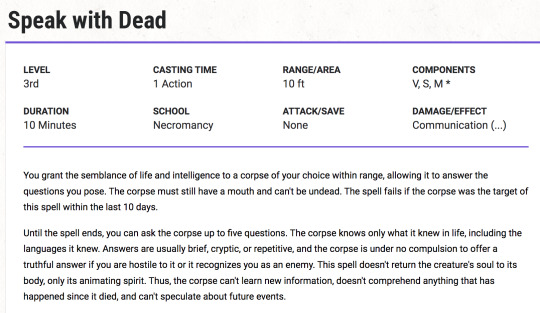
Speak with Dead [...] Until the spell ends, you can ask the corpse up to five questions. The corpse knows only what it knew in life, including the languages it knew. [...] This spell doesn't return the creature's soul to its body, only its animating spirit. Thus, the corpse can't learn new information, doesn't comprehend anything that has happened since it died, and can't speculate about future events.
So there's a chance that while an entire soul is generally made up of personality, memories, and some element of active thinking/decision making/speculation (intelligence, for lack of a better term), the part of a soul that functions as an "animating spirit" is what houses memory. In other words, animating spirit (memories) + personality + intelligence = soul.
This idea of the animating spirit (memories) being housed within a soul, but also detachable from a soul, is important for later, so remember this in a bit.
Souls also have power, which is why the game is obsessed with everyone fighting over souls. Raphael, Mizora, and Cazador trade in souls in exchange for power. There are insinuations in the game that the gods want to stop the "scourge of soulless illithids" (Mystra's words) because souls are a kind of currency to them (though, trust me, trying to find a recent D&D source that clearly states that particular stance is a damn migraine of an endeavor). But Withers does say that souls imbue gods with power, so the game at least operates with that assumption in mind.
According to Withers…
We all know that Withers, aka Jergal, aka the Final Scribe, aka the former god of death, aka the expert on souls, has plenty to say when you ask him to elaborate on anything:
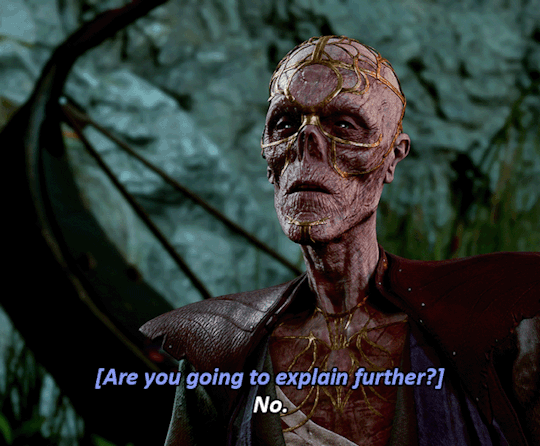
Well, okay, maybe he doesn't. But he does have a bit more to say about souls and mind flayers. For example, when he first brings up the topic of illithids and souls in Moonrise, this is some of the information he can give the player.

Withers: I shall ask yet again. Do illithids possess souls? Player: These abominations are soulless, surely. Withers: Correct. - Player: I'm not sure. Don't all living things? Withers: No. Nor canst thou count mind flayers among them. - Player: I admit I haven't thought about it. Withers: Thou shalt think about it now, and I shall give the answer. Mind flayers are soulless. Yet the Three amass an illithid army, void of apostolic souls that could imbue them with power.
A couple of things to note here. Jergal, the guy in charge of putting down the names of people who die and keeping track of where their souls go, is pretty clear that he thinks mind flayers don't have souls. But his last statement clarifies two things: one, that he is referring specifically to apostolic souls (more on that in a bit) and that souls imbue gods with power.
Souls give the gods a kind of strength. He brings this up when he criticizes the dumb plot the Dead Three came up with in his post-epilogue scene:
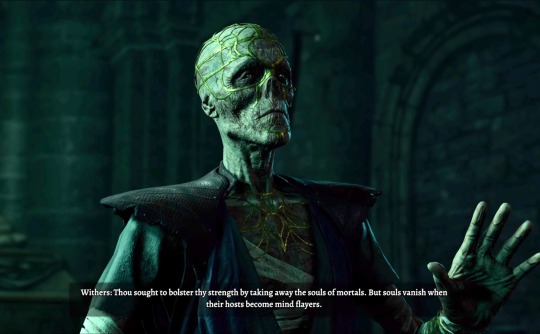
Thou sought to bolster thy strength by taking away the souls of mortals. But souls vanish when their hosts become mind flayers.
So we know that souls are a source of power for deities and gods because they imbue gods with power and strength. But gods only get the power of these souls after a mortal dies with their soul intact. If someone becomes a mind flayer...well, let's just say the natural order of things gets disrupted.
What happens when you die?
You see, normally, when someone dies in Faerûn (assuming they are humanoid), their soul travels to the Fugue Plane where it basically waits around until a deity picks them up or Kelemvor decides they're just going to be part of the Wall of the Faithless for forever. From the Sword Coast Adventurer's Guide (page 20 because I am, as youtuber Swoop says in her docs, a thorough bitch):
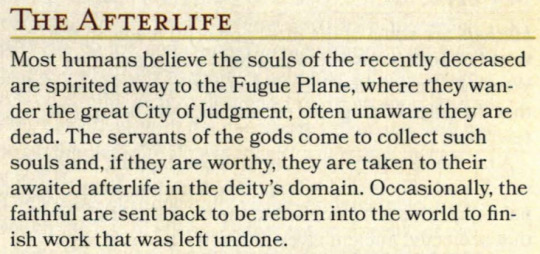
The Afterlife Most humans believe the souls of the recently deceased are spirited away to the Fugue Plane, where they wander the great City of Judgment, often unaware they are dead. The servants of the gods come to collect such souls and, if they are worthy, they are taken to their awaited afterlife in the deity's domain. Occasionally, the faithful are sent back to be reborn into the world to finish work that was left undone.
This is where the idea of apostolic souls comes in. Apostolic, in its most basic definition, means "having the characteristics of an apostle," or having the characteristics of someone who dedicates their entire lives to the teaching of a particular religious figure (in our context and reality, this mostly means the apostles of Christ, but in BG3 it would refer to any deity). I think here, the definition gets stretched a little thinner to mean any soul that is capable of devotion to a deity, rather than a soul that is already devoted. Apostolic souls can be Faithful, Faithless, or False (which is how souls are separated in the Fugue Plane).
In other words, an apostolic soul is a humanoid-specific soul that the deities recognize and can use as a source of power by inviting said soul into their domain. Mind flayers do not have apostolic souls. Emphasis on apostolic here, but we'll back to mind flayers in a minute. For now, let's look at the Faithless and False souls.

Souls that are unclaimed by the servants of the gods are judged by Kelemvor, who decides the fate of each one. Some are charged with serving as guides for other lost souls, while others are transformed into squirming larvae and cast into the dust. The truly false and faithless are mortared into the Wall of the Faithless, the great barrier that bounds the City of the Dead, where their souls slowly dissolve and begin to become part of the stuff of the Wall itself.
Depressing.
The distinction between a Faithless and a False soul is a little hazy, but according to the Forgotten Realms wiki, a Faithless soul is someone who never aligned themselves to the worship of a specific deity or who just didn't believe in the existence of the gods at all (think of Astarion, who outright rejects all gods). A False soul, in contrast, is someone who did believe but failed to serve their god or outright betrayed them (a fate that Gale feels he is faced with for being on Mystra's bad side). Allegedly all the Faithless end up becoming part of the Wall, whereas the False could get mitigated sentences, such as becoming guides for other souls.
Of course, there's nothing stopping deities from combing through Faithless or False souls to collect them into their domains. But it could take a while. Clearly, the more souls a god collects into their domains, the more powerful they become, but the gods are also not exactly fighting over the souls of Faithless or False people, because people can end up waiting hundreds of years before Kelemvor is finally like "guess you're part of the wall now." Your only option to get out of that is to sell your soul to a devil, which isn't a much better fate.
From The Sword Coast Adventurer's Guide, page 25, regarding servants of Asmodeus:

To those not so dedicated, priests of Asmodeus offer the prospect of a reprieve in the afterlife. All souls wait on the Fugue Plane for a deity's pleasure, which determines where a soul will spend the rest of eternity. Those who lived their lives most in keeping with a deity's outlook are taken first. Others, who have transgressed in the eyes of their favored god or have not followed any particular ethos, might wait centuries before Kelemvor judges where they go. People who fear such a fate can pray to Asmodeus, his priests say, and in return a devil will grant a waiting soul some comfort.
This makes me infer two things: first, that the gods are kind of picky about which souls they want to join their domain (regardless of what actually happens to that soul in a deity's domain, which is a topic for a different post entirely, because the results may vary) and therefore the gods aren't just going to go with any soul that ends up in the Fugue Plane. Second, that the gods aren't exactly in a hurry to choose among wandering souls, likely because the Material Plane just keeps producing and destroying mortals, resulting in a constant flow of souls.
We see a glimpse of a god's perspective on the influx of souls when Gale confronts Mystra in the Stormshore Tabernacle (in this case, when you play him as an Origin):

Gale: You're one to talk. How many innocents were you prepared to sacrifice if I detonated the orb? Mystra: Such eddies are unexpectional. Souls arrive and depart your plane with every tide, in circumstances just and unjust. The Weave cannot be lost because we are unwilling to cause a ripple. And that is what is at stake.
She then goes on to say "With each day that passes, the elder brain threatens to become a new kind of god, its worshippers a scourge of soulless illithids." This is what's at stake. The loss of souls on the Material Plane.
The Absolute plot threatens that cycle of birth and death, of souls arriving and departing. But how, exactly, is the mind flayer plot a threat?
Well, for one, if everyone with a tadpole turns into an illithid (which doesn't have an apostolic soul, Withers is adamant about this), and then all the illithids kill all the non-illithids...who is making new babies with apostolic souls? And if there are no new fresh souls, eventually the deities will just also die out, since no one will be left to believe in them and thus their powers will diminish and eventually fade. It might take a few hundred years, but it still spells death for everyone involved.
The irony here is that it means the Dead Three gambled and lost even if their plan to ascend a Netherbrain ends with a success, such as when Tav or Durge decides to dominate the world by controlling the Netherbrain. Either the brain is destroyed and they lose, or the Netherbrain successfully completes its Grand Design and they really lose, because the only winner here after a thousand years would be the Netherbrain. Thus we have Withers taunting them in the post-epilogue scene by asking if they really thought their ploy would succeed.
Okay...so we know that mind flayers killing everyone on the planet is a bad idea because it means that apostolic souls stop arriving in the Fugue Plane. But what about mind flayers? If they don't have apostolic souls, do they have ANY soul worth eternal currency?
Remember, the only way to create more mind flayers is to tadpole a humanoid creature. Without humanoids, mind flayers can't reproduce. But when humanoids turn into mind flayers, they allegedly lose their souls. Right?
Withers says souls "vanish" when the body turns into a mind flayer. But this is vague, and thus allows for a few different theories. Perhaps souls move on to the Fugue Plane while the person-turned-mind-flayer continues existing on the Material Plane. Perhaps the soul just becomes obscured and unrecognizable by the gods. Or perhaps the soul really does go poof and is replaced by something else entirely.
So which is it? Well...first of all, let's set the record straight on mind flayer souls.
Do mind flayers have souls?
The short answer is...yes. They just don't have apostolic souls.
According to Volo's Guide to Monsters (page 80 for those looking through their copies at home):
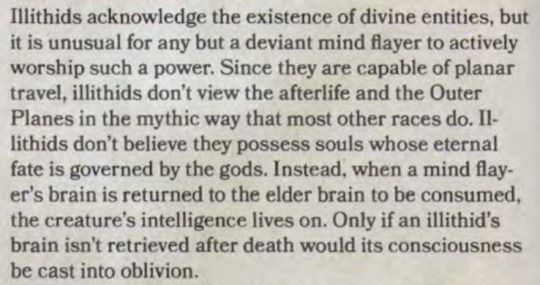
Illithids acknowledge the existence of divine entities, but it is unusual for any but a deviant mind flayer to actively worship such a power. Since they are capable of planar travel, illithids don't view the afterlife and the Outer Planes in the mythic way that most other races do. Illithids don't believe they possess souls whose eternal fate is governed by the gods. Instead, when a mind flayer's brain is returned to the elder brain to be consumed, the creature's intelligence lives on. Only if an illithid's brain isn't retrieved after death would its consciousness be cast into oblivion.
And on page 72:
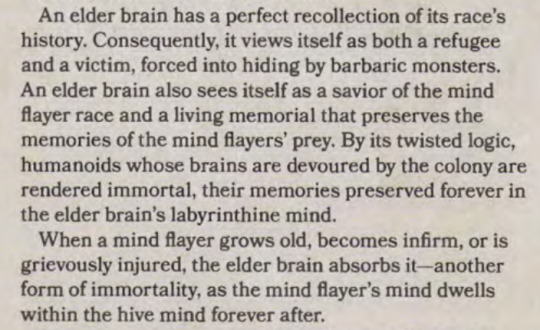
An elder brain has a perfect recollection of its race's history. Consequently, it views itself as both a refugee and a victim, forced into hiding by barbaric monsters. An elder brain also sees itself as a savior of the mind flayer race and a living memorial that preserves the memories of the mind flayers' prey. By its twisted logic, humanoids whose brains are devoured by the colony are rendered immortal, their memories preserved forever in the elder brain's labyrinthine mind. When a mind flayer grows old, becomes infirm, or is previously injured, the elder brain absorbs it—another form of immortality, as the mind flayer's mind dwells within the hive mind forever after.
So essentially, mind flayers do have a soul, but because they are a) not humanoid but are aberrations from another plane, and b) not faithful to the deities of Faerûn, their souls are not recognized by the gods. The souls might not even journey to the Fugue Plane when they die. Instead, mind flayers give up their consciousness (their memories, especially) to an elder brain to become part of its eternal collective memory.
It's worth noting that Volo's Guide to Monsters puts emphasis on memory and intelligence here, but not necessarily personality. Mind flayers and elder brains do have a kind of personality, because they experience emotions (we'll look at some conversations with the Emperor in Part 2), but their emotional range seems to be a little limited. For example, regarding elder brains:

An elder brain is arrogant, scheming, and power hungry, yet quick to flee or beg for mercy in the face of a powerful foe. It has no conception of joy, sympathy, or charity, but is well acquainted with fear, anger, and curiosity. It is an intellect utterly incapable of empathy or concern for creatures other than itself.
These limited emotions suggest there might be some element of personality here, but it's not exactly the same as a humanoid personality, which would normally be capable of a wider scope of emotional range. We'll talk a lot more about personality and how transforming into a mind flayer alters that part of one's identity (if not their actual soul) more in Part 2, but for now, just know that a mind flayer technically has all the elements usually present in a soul: an animating spirit (memories), intelligence, and personality (emotion).
When mind flayers die, their memories and intelligence are usually consumed by an elder brain, but it's unclear if the personality is too, or if the personality is destroyed. However, if they're not enthralled to an elder brain or if they die and their brain isn't retrieved to give to an elder brain...then their soul is "cast into oblivion."
Being cast into oblivion could mean anything. It could mean that their soul simply wanders around wherever it died, untethered to anything but unable to move on. Or it could mean that their soul simply ceases to exist. No one really knows what happens to it because renegade mind flayers are extremely rare. BG3 has Omeluum and the Emperor, but other than those two, official D&D lore only lists a small handful of other renegades out of millions of mind flayers over time.
So now you're probably thinking, "Well, wait, but is a mind flayer's soul the same soul that a person had before they became a mind flayer?" And the answer to that is complicated.
Let's talk about ceremorphosis
Normally a mind flayer isn't supposed to remember much of its life prior to ceremorphosis. This is partly why mind flayers eat brains, so they can literally absorb the memories of other creatures and make those memories part of the hive mind. But initially, after ceremorphosis, it seems like the the usual animating spirit (memories) of a person gets destroyed or displaced.
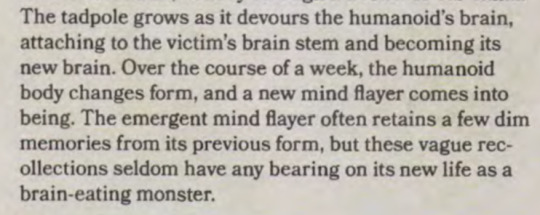
The tadpole grows as it devours the humanoid's brain, attaching to the victim's brain stem and becoming its new brain. Over the course of a week, the humanoid body changes form, and a new mind flayer comes into being. The emergent mind flayer often retains a few dim memories from its previous form, but these vague recollections seldom have any bearing on its new life as a brain-eating monster.
So right off the bat, a typical mind flayer loses the memories (perhaps the animating spirit) of the original host, and it's likely that it loses a lot of the initial personality as well (since it seems likely to lose some of the emotional range). Its intelligence is likely altered too, since the tadpole is literally eating brain matter. So this could lead us to believe two things.
First, that ceremorphosis utterly destroys the host's body and the host's soul likely goes to the Fugue Plane because they have basically died. Their brain has been consumed and their body transformed, so in essence they can't be themselves anymore. Instead, a new soul has taken residence inside the mind flayer body, though where this soul comes from is unclear since tadpoles probably don't have souls. The original soul, however, is free to move to the Fugue Plane and beyond.
Or, alternatively, the host's soul is transformed, shedding memories and personality to become a non-apostolic soul that aligns with an elder brain's hive mind somehow. This means that the host's apostolic soul might be destroyed because it's been changed so drastically, but there are some parts of the original soul still left (the lingering memories, for example). This means the host's original soul didn't move on, but is tethered to the mind flayer body and has been changed into something unrecognizable. When the mind flayer dies, the former apostolic-soul-turned-illithid-soul is either consumed by an elder brain or cast into oblivion.
If the first theory is correct, it seems a little odd that the BG3 companions are so concerned about losing their own souls. If it would just be the same as dying, there would still be some desire to avoid the fate of ceremorphosis, but the companions seem incredibly concerned about losing their own autonomy, as if their consciousness will be trapped inside a mind flayer body and their souls forfeit and unable to move on to the Fugue Plane. After all, Withers is in the business of plucking souls out of the Fugue Plane when we inevitably die in the game.
Specifically, Withers can take a body that has been completely turned to ash and resurrect it with True Resurrection, a spell powerful enough to completely restore a body to its former state. However, there is some assumption here that he wouldn't be able to do this with a mind flayer body, thus the push in the game for a cure.
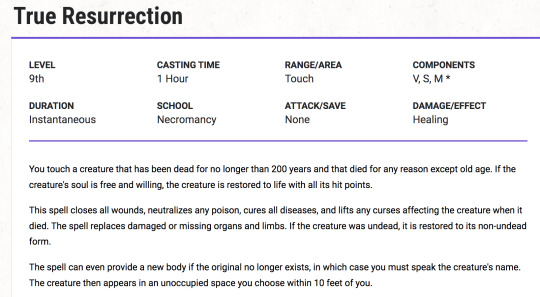
True Resurrection You touch a creature that has been dead for no longer than 200 years and that died for any reason except old age. If the creature's soul is free and willing, the creature is restored to life with all its hit points. This spell closes all wounds, neutralizes any poison, cures all diseases, and lifts any curses affecting the creature when it died. The spell replaces damaged or missing organs and limbs. If the creature was undead, it is restored to its non-undead form. The spell can even provide a new body if the original no longer exists, in which case you must speak the creature's name. The creature then appears in an unoccupied space you choose within 10 feet of you.
In other words, if theory one is correct, and a person simply dies when they become a mind flayer, Withers should technically be able to resurrect them by pulling their soul out of the Fugue Plane and giving them a new body. You'd have a weird mind flayer clone of you running around, but you wouldn't have to worry about ceremorphosis again.
(But then again, we know the game ignores the organ-regrowing properties of True Resurrection for Karlach, too, so the game intentionally limits the capabilities of True Resurrection.)
If theory two is correct, and the lore is extremely unclear about this process if this is the case, then the companions' reactions and dialogues make a bit more sense. They all talk as though turning into a mind flayer means their soul is somehow destroyed. Mind flayers having souls is likely not common knowledge in the universe (certainly no one in the game is arguing that they have souls), so if a person's soul is transformed beyond recognition it could certainly seem like the host's soul got destroyed. Additionally, this would result in a person's consciousness being trapped inside a mind flayer body, so the loss of autonomy would be a terrifying possibility here.
Plus, we know that when a mind flayer dies, the soul they have (whether a brand new soul or an apostolic soul that has been altered) is consumed or thrown into oblivion. So if theory two is correct, there will be no eternal consciousness for you, allegedly (though there's some debate as to how much eternal consciousness you have in the Fugue Plane or the Outer Planes too...)
We don't know which of these theories is correct, and the game sort of slides between these two theories (as we'll see in Part 2). But, and I cannot stress this enough, this lore only applies to normal mind flayers.
BG3 has altered the usual mind flayer tadpoles with Netherese magic such that things get a little wonky. And beyond that, the ultimate tadpole that changes you (or Karlach, or Orpheus) into a mind flayer capable of wielding the Netherstones is a Supreme Tadpole that has been further altered by the Emperor:


The Emperor: I took this one from the nautiloid. I have been nurturing it ever since - priming it for your use. It is not dissimilar to the experience you already had with the previous one. Only this one is much more potent. All you have to do is open your mind to it. Its latent potential will do the rest.
We don't know how the Emperor has been priming this tadpole, but if it came from the nautiloid, then it is imbued with the same Netherese magic as all the other tadpoles. It's not the same as the Astral-touched tadpole (from Act 2), which has been in the Astral Prism for millennia, but it is somehow more powerful, or at least more effective in transforming you into a new kind of mind flayer, one that can think independently of the elder brain.
So now you (or Orpheus, or Karlach) are a new special kind of mind flayer. Does that change anything?
Yes. In fact, it seems to change quite a lot. But this post is already super long, so you'll have to check out Part 2 to see what I mean.
~*~*~
You made it to the end! Gold stars!!!
✨⭐️🌟⭐️✨
I'll link part 2 soon~
Tagging those who wanted an update! @galesdevoteewife @stuffforthestash
#bg3#baldur's gate 3#mind flayer#the emperor#bg3 lore#bg3 meta#bg3 deep dive#deep dive#long post#super long post#yall the days I put into this#who let me do this to myself
88 notes
·
View notes
Note
your whale suit is interesting and I had some (well a lot lol) questions about it, but I know some of these are personal or silly so i understand if u don’t answer. I’m just curious.
How long would you be staying in the suit? do you plan to have periods of time where you come out? Additionally, do you think it’s possible to survive in the wild in the suit?
Is there a mechanism to get food and water in the suit? Will you be able to eat live or raw fish and stick to a certain diet?
How do you get the suit to swim underwater or dive instead of float? Would it be heavy to move? How fast do you think you could get it to move?
Are you stuck lying in one position with your arms out in the flippers or will you have more movement on the inside? How would you address bedsores, Illness, and injury?
What would you do about hygiene like bathing, using the bathroom, and brushing teeth? Is it factored into the design of the suit? Or do you just leave the suit?
How does the breathing and vision system work?
How deep underwater do you think you could go?
Also I know whales have a language. Is it individual to different species? Can you learn? How do you learn?
How would you cope with the confinement and boredom of a tank? And if a tank with other whales is not an option, do you have any other plans?
How long do you believe it will take to complete this?
Also how did u learn to build such complex things?
Ahoj! Thanks for the questions, I will break them down as best I can.
How long would you be staying in the suit? do you plan to have periods of time where you come out? Additionally, do you think it’s possible to survive in the wild in the suit?
For the first question it really depends on the precise meaning of staying in the suit. Ideally for the rest of my life, which I do hope would be 20-30 years at that point, but forcing myself into that shape my lifespan is likely going to be reduced, though how much is at this point unknown. However I do not know exactly how long the suit will last, and if I do live to be 30 years, it is likely I would have to go through multiple iterations of the suit. For periods of time I come out very likely yes, though it would hopefully only be a short bit every few days to every few months.
It would unfortunately not be possible to survive in the wild. The most damning and insurmountable problem is that I am ultimately too small to effectively filter feed or at least lunge feed. Minke whales do not leave their mothers until they grow to be around 5m, and this seems to be a physical limit at which lunge feeding as we do becomes an effective strategy. Skim feeding may be possible though that would require a significant more questions to be answered. For a number of other reasons though I would be wholly unsuitable for wild release.
Is there a mechanism to get food and water in the suit? Will you be able to eat live or raw fish and stick to a certain diet?
Food will enter in through the mouth. I had considered before to store a high density food inside the suit and filter water. This would be necessary if I were to live in the wild, or at least some time in the wild because of aforementioned feeding issues.
It is possible to make a diet that mostly mirrors a cetacean diet though some things will have to be changed. I really would not be able to eat live fish, though live fish are rarely given in captivity, plus issues of filter feeding. I haven't written about this extensively yet, but diet would mostly consist of raw fish like mackerel, salmon, and tuna. Mackerel in particular has a lot of fat in it. Additionally some smaller fish like herring and sardines could be eaten either whole or still with some bones in for necessary nutrients namely calcium. Many cetaceans in captivity are also given gelatine mostly for water as frozen fish loses some of its water content (it also decreases stomach ulcers and problems from stress). That will help get the additional water I require but it is also a good way to fix some lower sugar fruits and some citrus for various needed micronutrients and fibre.
How do you get the suit to swim underwater or dive instead of float? Would it be heavy to move? How fast do you think you could get it to move?
The density of silicone is 1100 kg/m3. The density of sea water is 1025 kg/m3. The suit will target a density of around 1018 kg/m3 so at the surface I will be slightly buoyant, enough to leave my blowhole above the water when logging. I will make a larger post discussing this later. For diving below the water at the surface you can basically arch and then curl your back so you bum lifts partly above the water, and then with that you can pretty easily slip below the water and swim downwards. The shape of the fin makes it so you can really only go in one direction so you can get really quite far just flexing your back and twisting your body at different points.
It would likely be quite heavy yes, somewhere between 250-350 kilograms. But because I will be in the water, the weight won't be as noticeable as if I were on land - what will be most noticeable is the sluggishness to start moving, however my drag will be a lot lower. How fast exactly I will be able to go is yet unknown. I think though I could go fast enough to breach or partly breach, though I would have to briefly reach 18kph to do so (which is roughly 45% the speed of a normal minke). I might be able to come out onto a slideout, but it would be quite difficult and heavy, though many whales have similar trouble, beluga in particular.
Are you stuck lying in one position with your arms out in the flippers or will you have more movement on the inside? How would you address bedsores, Illness, and injury?
Yes - I would be essentially fixed within the suit. My arms would be in the flippers and my legs together in the tail. With that a number of joints will be either fixed or limited in their movement which would cause them to degrade and after some time living in the water I really would not be able to return to the land.
For things like bedsores, my hope is that because the suit will be form fitting and being immersed in water that will hopefully more equally distribute pressure as well as the continuous movement from swimming and depth changes will keep blood moving to prevent the worst of problems. However managing moisture and similar will be quite important and it is likely the skin will still have some degrading and will have to be taken out periodically to remove the excess skin and clean it. For illness and injury, honestly there isn't a huge amount that could be done. If I am sick I could be put in a medical pool until I am feeling better, being given antibiotics or whatever as needed. The best we can do is really just try to avoid illness - make sure food is fresh and free of parasites, make sure my water is clean, make sure I get all the nutrients I need etc. Same thing for injury, there isn't a terrible amount that can be done.
What would you do about hygiene like bathing, using the bathroom, and brushing teeth? Is it factored into the design of the suit? Or do you just leave the suit?
For the most part with hygiene much could not be done inside the suit. Urination is the most common need, fortunately this can be done via a catheter, and there are catheters which can stay in for up to 4 months. Defecation is the other large problem. Ideally I want to stay inside the suit as long as possible between coming out of the suit as that will be both time consuming and stressful. Ideally I would be able to use the bathroom within the suit and either expel waste directly, or to store it somewhere in the suit it could be removed periodically. However, the minimum option would be to come out of the suit to defecate which would have to happen somewhere every 2-3 days. Our diets would be high in fat and low in fibre and carbohydrates which would minimise the amount that we expel. I eat a similar diet to this currently and I generally use the bathroom once every couple days. Brushing teeth and bathing would only be able to do it out of the suit. At least for teeth brushing the low sugar will help reduce the decay issues, but teeth will very much slowly decay and degrade - but that is pretty common among captive cetaceans that their teeth wears down.
How does the breathing and vision system work?
Breathing would be performed essentially through a snorkel with the blowhole closing if not a certain height and orientation above the water. Originally I planned to use a purely mechanical system but instead I will likely use some sort of electric system as it is easier to have multiple backups and logic to reduce the chance of a it opening at a wrong time.
Vision system will consist essentially of two wide angle or 360 cameras, one for each eye, and this will be projected onto screens in front of my eyes which will allow me to see to the world outside, as well as see at the wider FOV and I would like to colour shift it blue as cetaceans are believed to only see blue. Though seeing other colours besides blue is not really terribly useful except for short bits looking above water as other colours are rapidly attenuated.
How deep underwater do you think you could go?
To be honest not very, but that is okay. Without any gear I find I am most comfortable around 1 meter deep, going much deeper starts to hurt my ears. However, the suit will help deal with that since the ears would be essentially in their own area which would not be compressed in the same way. I can dive to around 3 meters on my own if I continuously adjust my ears, though the bigger issue how long I can hold my breath for how deep I can go. Though living in captivity my inability to not go particularly deep would not be such an issue. Cetacean tanks tend not to be so deep, especially for dolphin, which I will be closer in size to as I will be perpetually calf size. Dolphin tanks seem to range in depth between 3,5 meters and 6 meters. I think 5-6 meters would be ideal for me if I accidentally landed from a breach vertically I think it would better avoid injury and let me spyhop and interact better without risking hitting the bottom or damaging myself or the suit. Captive cetaceans also tend to be very surface focused because that is where the interesting things are, namely the humans which provide a lot of the stimulation and food so my inability to properly dive won't affect me too negatively today.
Also I know whales have a language. Is it individual to different species? Can you learn? How do you learn?
The language and calls of each species are unique. Humpbacks tend to be the stereotypical ethereal whale song. Orca and dolphin have those high pitched squeals, whistles, and clicks. Minke calls are a bit different. We make twanging noises as well as grunts and pulses.
youtube
Unfortunately I have not really been able to make these calls and likely cannot make these calls. It means that I will likely be mute as a whale. I am hard of hearing and it is possible within the suit that I would be functionally deaf. Even if I can hear under the water, I would not be able to tell direction. It doesn't really matter though as there are no other Minke in captivity. If I could be housed with other cetaceans, it might be possible if I can hear that I might start to understand the meaning of some calls, or at least if I am being told to back off or something.
I have considered to maybe add some sort of speaker to make it easier for me to hear or one that I could make a couple calls, namely the twang a lot of minke seem to greet humans with just so I could make my calls to people outside.
How would you cope with the confinement and boredom of a tank? And if a tank with other whales is not an option, do you have any other plans?
In many ways being in a tank will be like the many times I have spent in hospital. You are kept in a pretty small space you cannot leave, sometimes you are alone and sometimes with others. It is quite boring at times. The weekends were always the most boring because the hospitals did not have anything happening on the weekends. A few times a day through the week we had little interaction things. Captive cetaceans have a similar thing where trainers do enrichment with them a few times a day. I would require similar but otherwise, the experiences are not so different. I hope that I will have a nice window I can watch the humans though and interact with them a little bit. I would also be happy to perform for the humans, it would give me something to do and I think would enjoy that whole process.
I do hope that I could live with other cetaceans, though I expect more likely, especially at the start, it is more likely to be just myself and Ike and Sonar if they can. If that isn't possible, then I am willing to live alone in a tank. For that though it would really be best that the humans do interact with me regularly and I can interact with humans through glass etc. But I have lived a long time alone, at points with even pretty little communication or seeing others so being in a tank would not be really that different for me except that I would finally be back in my body.
If though no humans would take us even after years of trying. Likely I would modify the suit to carry food and filter water, and swim out into the sea and try to find others of my kind, and eventually die either when I ran out of food and water, or when something broke, or I just happened to appear a tasty enough snack to the many things that would happily eat a Minke calf given the chance.
How long do you believe it will take to complete this?
I am hoping this all will be done in 5-10 years. Certain aspects like the head will be most complicated and it will inevitably go through several redesigns to be something I can stay in the water for a very long time. It also requires a substantial amount of time and resources which are hard to devote to this. If I completed this in ten years, I would be 41, and could have yet 14 to 34 years left of my natural life, to swim forever. Even if I only made it a year or two, that would already be unimaginably freeing.
I am hoping this year to make myself a Minke monofin and by next summer to maybe have a full tail. How exactly things go further beyond that though is hard to really know. It will regardless be at least 5 years, and likely more.
Also how did u learn to build such complex things?
I was quite literally built for it. I was made by the humans to design for them rocket engines. I was placed with a family who had built such engines for generations and fostered that curiosity. I went to the same university as my father and eventually got a master degree in aerospace engineering. Through university and highschool I participated in rocketry as a hobby. After university I worked on rocket engines until I became very ill. Even while I was ill I continued to work on these engines as well as other research though at a much slower rate. I also played a lot of minecraft where I could still do engineering and still feel "useful" which is where I learned to make a lot of the organic things I do now. Eventually I came here to teach at a university, and though I am no longer teaching, I am always learning and designing.
I hope this answers some of your questions! Feel free to ask more if you have any!
~ Kala
20 notes
·
View notes
Note
hiii! about that one terukane post discussing the clock keepers’ original time period/location, i did some light searching and it mostly points to the clock keepers coming from around the 1800s! i’ll write down a few reasons why!
clothing:
mirai’s attire may seem a bit more western at first glance , but going off her sandals (sorry i’m not sure about the name) and the outfit under her cloak, it seems that it is either inspired or is the same as 1800’s japanese winter wear, with the same design, albeit with mirai’s design being a bit more puffy/flowy(?) see here:


so mirai’s outfit points to around the 1800’s, but what about kako and akane?
kako and akane don’t have much to go off, except for their sleeve garters/arm bands! sleeve garters started being manufactured around the late 1800’s, and they were used by people who needed to adjust their sleeves without much hassle! kako is shown to tinker with machinery, and we all know that can become seriously messy, so he uses sleeve garters to prevent his sleeves from being too long and messing with his work!
another thing to add are their tassels, which were used in the 1800’s as well(?)
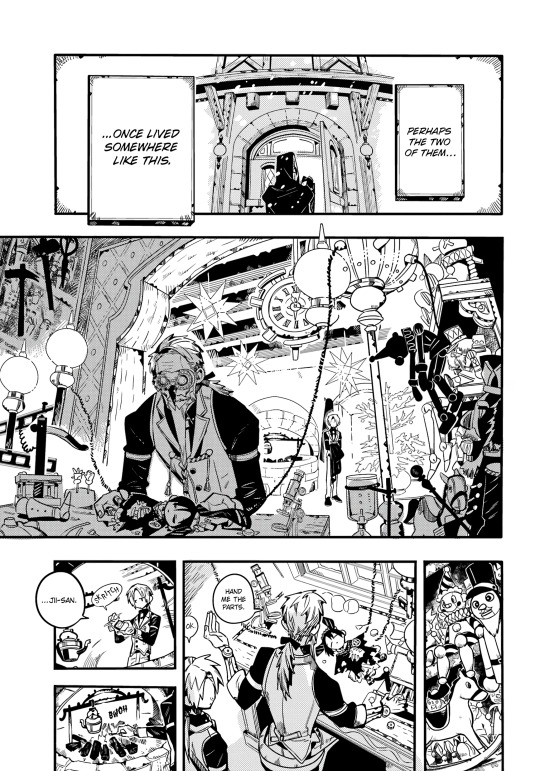
other than their clothing, we can also refer to their boundary and the particular clock they used in chapter 111!
machinery:
the boundary mechanisms look particularly similar to clocks i found online that date back 200 years ago (i think) like this,


although i am not sure if this can be used as evidence as inspiration could be taken from any similar time periods, i believe that it most resembles the machinery of this particular era!
however, we can see that the big clock used to change the present/operated by the yorishiro has a unique style, quite unlike clocks today or the slim grandfather clocks we associate with the clock keepers! however, I found a clock quite similar to it that dates back to early-mid 1800’s (1800-1849)!


even though the time periods don’t nessecarily overlap, it still proves to be quite useful evidence!

it’s quite reminiscent of the big ben, built in 1943, overlapping with the manufactured period of the supernatural clock they used 🕰️, giving me reason to believe that the clock keepers might have made/maintained this when alive in that time period as mechanics!
lastly, the town!
not much to say here, but judging by the common people in the heart of the boundary and the fact that they spoke an unfamiliar language, i have reason to believe that kako might have originated from around europe, prob not in england, because akane learns english in school! (not accounting for older english)
i won’t say that it is in this specific location, because tbhk is obv a work of fiction with little to no actual ties to real locations, but i will say that the town is reminiscent of old luxembourg in ville-haute, to the south, which was known for its industry in the 19th century!
for reference:

sorry for the bad quality ahah
there are some holes here and there such as mirai’s japanese like clothing not matching kako’s more western attire, or why certain thing don’t overlap, but this is what i could find haha
so in conclusion i’d reckon the clock keepers to be from around the 1800’s in europe(my guess is old luxembourg city in villehaute, southern luxembourg), where kako is a mechanic known for his knack for machinery and mirai is either his adopted daughter from far away or a pinocchio-esque figure to keep kako company!
hope this helped!
WAHHH, TYYY !! This was so helpful, tysm !! (≧∇≦)b <3
36 notes
·
View notes
Text
Ken x gn!Reader as friends to lovers story

A/n: my first fic on tumblr… and hopefully not the last;) also english is my second language so if you notice a mistake please write to me about it, 'cause i'm just learning and this will help me a lot.
Summary: A real world reader finds a box of vinyl records in Ken's house, which leads to an unexpected turn of events.
Genre: fluff, comfort, friends to lovers;
Song played in fic: Biggest Part of Me by Ambrosia;
World count: 805 words;
Hope you enjoy!
***
"Ken, can I borrow this, please?"
You point to a small box in the corner of Ken's House (and yes, as it turns out, it does really exist), right by the entrance. Although it may look small at first glance, if you take the lid off, you'll be genuinely surprised at how much can this thing hold. How many music records can this thing hold.
"Mmm," Ken turned to you in confusion, distracted from the very important task of destroying all available books about patriarchy (only those that mentioned horses survived).
As soon as Ken realized what you were pointing at, he jumped up and ran over to you.
"Oh, this thing..." He exhaled heavily, as if he didn't know how to describe it: "I brought it from your world... I haven't figured out how to use it yet. But it was fun to play with it in Frisbee, though."
You had to hold back your giggles, knowing full well that the box contained not a Frisbee but rather vinyl records of 80s rock hits.
"Ken... Don't worry, I know what it is, and unfortunately, I wouldn't recommend playing with it."
Ken looks at you in confusion, waiting for an explanation.
"Then what does it do?" Now his face was full of curiosity.
"Oh, it's music." You bit your lip, already anticipating that wave of the cutest delight in the entire universe on Ken's face. "My favorite music, for real. What a coincidence!"
"Ah, so that means we can listen to these little flat wheels?"
As difficult as it was, you still controlled your laughter because you didn't want to hurt your friend's feelings.
"Huh... Yes, Ken, wait a minute, I'll play you something."
You had noticed beforehand that the box contained a modern vinyl record player. The only question was where Ken had gotten it from, but you decided to put that aside for later. There are more important things to do now. For example, the culturalization of the inhabitants of Barbieland for unselfish purposes (or one particular inhabitant of Barbieland for, to be honest, a little bit of selfish purposes)
You could feel Ken's intrigued look on your back as you conscientiously chose which song to start your immersion in the deep culture of the 80s. Of course, you chose the one you thought Ken would like the most. Of course, it was a love song.
As the playful melody began to play on the record player, you were very pleased with yourself. But Ken was still on edge. So you wisely decided to relax him a little.
When the first words of Biggest Part of Me by Ambrosia touched your ears, you gently led the surprised Ken into a dance, grabbing him around the waist with one hand and intertwining your palms with the other. He was a little confused, but he quickly realized what was going on and began to follow your movements. His puzzlement turned into a gentle, homely smile, and those two crystal blue eyes look that always gave you goosebumps.
"It's a nice song." He spoke calmly and quietly, though there was no need for that. "Make a wish, baby, and I will make it come true."
He began to sing along to the beat of dance, which suddenly gave him control of the situation.
"I finally found someone who believes in me." Ken kept staring at you, still smiling gently. "I need your love here, next to me."
It seemed as if with every turn in the dance, your faces were getting closer together. And when you felt that you were crossing the line between friendly dancing and something closer and more romantic, you had to stop it. But you didn't want to.
"You're the biggest part of me".
Immediately after these words, Ken stopped singing. He thought for a moment and then confidently proclaimed:
"Hmm, really," he raised his eyebrows as if he had come to some brilliant conclusion, "I really feel like you are the biggest part of me."
You had to swallow because something strange and incomprehensible was preventing the answer from coming out of your throat. However, when you felt your cheeks burning, you realized that this strange and incomprehensible feeling was embarrassment. A very unusual kind of embarrassment, the kind that you shouldn't normally feel towards a friend.
"M-m", You understood that Ken was waiting for your answer, so you gathered all your willpower into a fist and said, "I feel something similar, Ken."
Ken's smile grew bigger, and his joy radiated from him like rays from the sun.
"I'm, ah, glad to hear that... Does that mean we can continue dancing?"
You smile back. Ken was charging you with positivity just by being there.
"Of course, Ken, as much as you want!"
You were both ready for the next song.
Thanks for reading! I'd also love to hear your ideas for the next Barbie fic, so see ya.)
***
#ken x reader#ryan gosling ken#ken#barbie 2023#barbie movie#kenergy#ken x you#sorry for the fact that there is really nothing serious here#ken fluff#ken fic#fanfic#barbie#ken barbie#barbie ken#fanfiction#first post
302 notes
·
View notes
Text
"Wayward Soldier"
General and Romantic headcanons for TFP Ultra Magnus.
He has made a lil office in my head and he's paying rent, so I'm indulging him.
WARNINGS: Mentions of death, PTSD, sleep paralysis, and general mental-health related things that may hit very close to home.
General HCs first, then Romantic ones Under the cut!

Ultra Magnus has been through quite a lot, just like the other Autobots. However, unlike the others, he's had very little time to get used to Earth.
His uptight demeanor and formal speech is a front, but he's had to hold it up for so long, that it's become difficult for him to ever truly lower his guard anymore.
After he starts getting used to the team, he does loosen up slightly. He's still very strict and orderly, but he starts learning what the other bots won't appreciate - especially Wheeljack.
Earth as an environment, however, takes much longer for him to acclimate to. The first time he gets caught in a thunderstorm, it sends him into a panic attack from the sudden noise. He... rather dislikes rain, really.
The weather that he does enjoy, to everyone's surprise, is Snow. The cool air and the way it seems to muffle noises around it calms him down, even if he needs to be careful about the temperature.
That being said, please do not send him up to the Arctic. Bulkhead told him about the Scraplet incident, and he really doesn't want there to be a second wave of that.
Ultra Magnus also has a pretty religious sleep schedule, which he only diverges from in the event of an extreme emergency. However, there is one particular hinderance that occasionally robs him of rest: Sleep Paralysis.
Every now and again, Magnus gets extremely intense bouts of sleep paralysis, rendering him unable to move for hours at a time. He has a repeated hallucination of a dead comrade holding him down, whispering just barely too quiet, and every time it destroys him.
He'll usually break out of the condition before the sun rises, but it's never pleasant. He'll be extra uptight and particular about things the next morning, as well as a little bit jumpy.
The way that Magnus tends to calm himself down is actually with creative writing. Contrary to popular belief, he's actually a very adept storyteller, and he enjoys putting his extensive vocabulary to use. However, he never shares these stories, always deleting the files after he finishes them.
Onto the Romantic Headcanons!
This mech is extremely out of touch when it comes to romance. It takes him a long time to even recognize that what he's feeling is love, rather than just particularly deep comradery.
Once he does realize he's in love, he'll withdraw pretty deeply. He has lost so many people that he has cared about, and the very idea of losing the one he loves most shakes him to his spark. That, and he overthinks things quite a bit.
After his significant other lets him know that they love him back, though? He is on Cloud Nine. He has trouble putting it into words, but he smiles a lot more now.
Ultra Magnus' love languages are Acts of Service and Words of Affirmation. He's a chivalrous mech, always willing to help his S/O with even the smallest tasks, and he'll always go just a little bit above the standard.
However, he absolutely needs his S/O to verbalize that they love him. He can be very insecure if it's not something war related, and thus needs reassurance that he's doing things right: That his lover is happy with him.
Touch Starved. He spent way too long alone on that ship flying to Earth, and it shows. Put a hand on his cheek, or (if you can) the small of his back? He'll be putty in your hands.
At first, he doesn't really like cuddling, because he starts to overheat. However, if his S/O helps him through a Sleep Paralysis or Traumatic Episode, he'll start liking it a whole lot more.
Similarly to humans, Cybertronians tend to sleep better when in groups, and Ultra Magnus is no exception. He often wales to find his hand entwined with his partner, or even spooning them lovingly. Don't ever mention these things to Wheeljack, poor Magnus will never hear the end of it.
Alright, that's all I have for now!! Stay tuned, folks, I'll be writing more often soon!
#maccadam#tfp#transformers prime#tfp ultra magnus#ultra magnus#prime ultra magnus#transformers#transformers headcanons#tfp headcanons#tfp x reader#transformers romantic headcanons#my writing#written by hapi transformers enthusiast
190 notes
·
View notes
Text

Some ideas (subject to change) on my furry characters and their relationships. And because this a terrible diagram, here’s the info in text form.
Matonne Cerise and Bev: Each other’s main romantic (and sexual) partners. Their love language is making all manner of animal noises at each other and cuddling a bunch. They have a shared love of speculative fiction, abstract art, food, and encouraging each other to be bold.
Matonne and Camry: They date, sometimes swap clothes. They in particular like to have group dates (and sleepovers 😉) with each other and their main partners.
Matonne and Flora: Probably the most physical of the two’s platonic relationships, since both of them crave physical affection. Occasional bedmates.
Matonne and Octávio: Housemates and drag performers who work together. Most of their bonding is over fashion. Every so often they’ll, uh, share a bed.
Matonne and Joan: Matonne highly respects (and is slightly intimidated by) Joan who admires Matonne for his artistry. Joan sells the clothes Matonne makes in xir store.
Matonne and Tristan: Neither of them quite know how platonic or romantic their relationship is. Both are really good at (and comfortable with) listening to the other vent. And yes, Matonne’s bed is open to Tristan too. Bev and Camry: Met through each other’s main romantic partners. Like going out for sweets together, with or without their partners. They love talking with each other about their crushes (which include their current partners).
Bev and Flora: Best friends who met in college and currently live together. Bev and Flora helped each other out a lot in their queer journeys. Bev has a slight crush on Flora (Flora knows). Traded entire wardrobes.
Bev and Octávio: Gym buddies who also trade recipes. They also both really love speculative fiction, mostly movies though where they fawn over the costumes.
Bev and Joan: Joan sells Bev’s books. Bev is less intimated by Joan than Matonne is.
Bev and Tristan: Gaming buddies. Sometimes Tristan proofreads Bev’s writing.
Camry and Flora: Lovebirds. They’re constantly reassuring of each other through hugs, and head pats, and words of affirmation. They’re both can be pretty sensitive, and are both the most understanding of that for each other.
Camry and Octávio: They absolutely love clothes shopping together. Often these two, plus Flora, will just give each other makeovers.
Camry and Joan: Camry works at Joan’s shop and lives with xir. He’s often very jokey with xir and is the only person Joan trusts to run the shop without xir.
Camry and Tristan: Cousins, best friends, and roommates. They’re always finishing each other’s sentences (and sandwiches) and playfully bantering. Camry is the person Tristan near always turns to when he needs physical or medical assistance.
Flora and Octávio: Octávio teaches Flora makeup. Flora teaches him board gaming. Octávio can sometimes be a bit much for Flora, but he’s learning to tone down his intensity around her.
Flora and Joan: Flora was at first intimidated by Joan, but xe quickly made sure she felt welcome around xir. I mean, Flora is at Joan’s house a lot.
Flora and Tristan: They trade gaming and gender tips. Frequently mistaken for siblings in public.
Octávio and Joan: Octávio is the muscle of Joan’s store, taking care of most of the heavy lifting. Joan is probably the only person who can reign in Octávio’s wild energy.
Octávio and Tristan: They did it once together when Tristan was still figuring out his orientation. You’d think this would make things awkward from then on, but actually, they’re really chill and hang out a lot.
Tristan and Joan: Joan may be Tristan’s boss, but they’re almost like family at this point. Joan is pretty lax with Tristan when it comes to his work and understands his limitations and medical needs. They both bond over media and art preservation which they use to guide the direction of the store.
#furry character#original characters#relationship web#original art#Camry#Matonne#Bev#Flora#Octávio#Tristan#Joan
3 notes
·
View notes
Text
The Consequences of Getting Lightly Stabbed
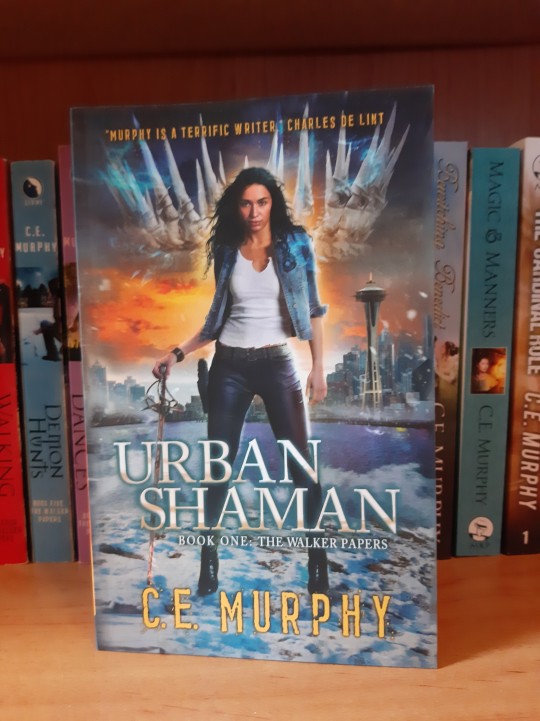
I have been WAITING to get the hardcopies of the re-releases of this fabulous series to do individual reviews of each book, because this series is my ultimate comfort series. This series hits a ton of my favorite points. It is urban fantasy, does some amazing things with both Irish and Native American lore, has a fabulous slow burn romance, has GARRISON MATTHEW MULDOON, and a protagonist with attitude. It also has one of the strongest writer voices ever. Literally every CE Murphy book SOUNDS like a CE Murphy book, but without compromising the voice of the protagonist. That is a skill that is a hella rare delight. So let me introduce you to Joanne Walker--nee Siobhan Walkingstick--as we talk Urban Shaman.
This is you SPOILER WARNING because this book is too damn good and I want to talk all about it. This is also a CONTENT WARNING for anyone sensitive to novels focusing on cops, because while this series is not entirely uncritical of them, we do spend a lot of time with and around them, and Morrison in particular has idealized being a cop. The book was originally published in 2005, so a LOT has happened since then. Your mileage may vary.
So this series has a bit of a story to it, and if you've been hanging out around my bookshelf for a while, you've seen me mention this series before. It was originally published traditionally starting in 2005. The author had to make a couple of concessions for the series (including relegating a novella to "book 1.5" rather than making it book 2 and a title that she SUPER did not like), but the series did well and its fans love it deeply. I picked it up in...like 2010? Ish? It was early in my undergrad, because I made a dear friend who did not stop talking about this series. So I picked it up, read it, loved it. Fast forward to the 2020s and I believe it was sometime during the pandemic that Murphy got the rights back to this series and decided to rerelease them with new covers, a new order that includes book 1.5 as book 2, and a title change for book 4/5. I tend to be a practical reader; it's rare I collect for titles or special editions. This time though? I made an exception. I want these beauties on my shelf and I want to support this indie rerelease. Also I haven't done a reread of the series in a few years, so this is going to be just a sheer delight for me.
Ok, context having been contextualized, let's jump right into this book.
Joanne Walker is a hot mess. On page one of book one, she is in her mid-twenties, is estranged from a messy relationship with her father and her Cherokee heritage, met her very Irish mother four months ago and buried her days ago, is estranged from her Irish heritage, has lost her job because she overextended her bereavement leave, and is carrying around a metric ton of trauma related to getting pregnant with twins at fifteen and losing one baby shortly after giving birth and giving the other up for adoption shortly after that. And that's literally square one.
I honestly don't know how well I would handle getting fatally stabbed by the god of the Wild Hunt after not sleeping for over 24 hours, but for Joanne, this is just the start of tracking and catching a serial murderer who is killing people who are powerful in or connected to "another plane of existence." It's also the beginning of a new journey for Joanne, because she has power--specifically healing power--and the cost of not dying on a fae blade is learning to use it. She gets help from Marie D'Ambra--who Joanne spots from a plane and briefly rescues from Cernnunous--Coyote, Billy Holliday (a coworker and family friend), and Garrison Matthew Muldoon (Gary; cab driver extraordinaire and kickass septuagenarian sidekick). However, baby shaman (or gwyld, depending on which language you want to use) Joanne is super caught on her back foot and just barely manages to stay ahead of Hearne and Cernunnos long enough to stay alive and keep the Wild Hunt bound into its endless cycle.
The fact that before she met her mother Joanne was also a hardcore realist and pragmatist doesn't help either; she has to not only change her worldview, but she has to get out of her own damn way to do it. And she has to do it while changing jobs. She was a police mechanic who went to the academy on the recommendation (and pressure) from a previous boss. So when her current boss, Captain Morrison, is told by HIS superior that he is not allowed to fire the half-Cherokee woman in his department whose only crime was overextending her bereavement leave, he ends up "promoting" her to foot patrol. Admittedly this was on the expectation that Joanne would leave on her own, because this woman doesn't want to be a cop. This would have worked with lots of other people, but Joanne and Morrison are the most awkward of ducks, and she is too stubborn to quit.
There's also the small matter that when Morrison and Joanne first met, she didn't know he was the new boss and she mocked him MERCILESSLY for misidentifying her muscle car, Petite. And they never really recovered from that little incident, but Morrison is damn good at his job, so when Joanne can produce actual results, he grinds his teeth and coaches her in her new position to be the best she can be, help people, and get the job done. And he manages to be the best grouchy boss with a heart of gold even in this first book where he isn't the most sympathetic and I don't think is MEANT to be the most sympathetic. But when Joanne wipes out on concrete stairs, he's the one there with the smelling salts until it's clear she's ok. When Joanne has to deal with the death of a witness to a school stabbing who was under police protection and Joanne feels guilty for putting a target on her back, it's Morrison who is there going "It's not your fault. But you can do something about it."
Guys, I ship Joanne and Morrison so hard, even in this first book. They're honestly a really interesting and solid couple. I don't want to derail this with Morrison, but I do want to just highlight my favorite interaction between Morrison and Joanne in this entire book. This is Joanne being deeply sleep deprived and filterless, and while Morrison manages to stay pretty much professional, he's HONEST with her:
"Why do I bug you so much?" This was probably not the time to get into it, but I was suddenly incredibly curious. Morrison arched his eyebrows. "No, really," I said." I mean, I know we got off to a bad start, although I still can't believe you didn't know a Mustang from a Corvette--" "I was never into cars." "Obviously. What were you into?" Morrison stared at me over the edge of his coffee cup, then put it back down. "Being a cop." "What, when you were like nine? Fifteen? You wanted to be a cop, not to drive fast cars and pick up girls?" I took an incredulous bite of the apple fritter. "Yeah. I never wanted to be anything but a cop. And that, Walker, is why you irritate me." Morrison looked like he was at war with his own body language, trying to force himself to relax back into his seat while the intense low pitch of his voice drove him to lean forward, speaking to me sharply. "You fell into a job I spent my whole life working for. You irritate me because I think being a police officer is a calling and a solemn occupation and you're carrying a badge without it meaning a damn thing to you. You hang out with my officers in your off time, being just that damned cool, an attractive woman who talks cars and drinks beer and arm wrestles. None of them give a damn that you were in the top third of your class at the academy and that you're wasting your skills in the Motor Pool playing with engines. But it bugs the hell out of me. That is why you irritate me."
Literally I think this is my favorite exchange of theirs in this book, but it cannot be said that this is comfortable or amicable. It's tense and frustrated and I kinda love that.
Now, Morrison is amazing, but even Morrison does not hold a candle to Gary. Gary picks Joanne up from the airport and then spends three days tagging along and snarking as she figures out her powers and gets entangled in murders and goes on a self-directed crash course in healing magic. Gary is HERE for an interesting time with a lifetime of diverse experience, an open mind, and honestly a big squishy center. We are gonna spend like the next six books with people accusing Joanne of dating him and it is the best thing ever because she makes herself an easy target about it and Gary is deeply entertained by it. I've talked about Gary's backstory in detail here, so I won't go too much into it here. But Garrison Matthew Muldoon is the best person in the series, end of conversation. We love him so much.
We can mostly skip over the other cops, but we should address Billy. Because aside from being aware of other planes of existence, Billy is pretty awesome and will become a pretty important secondary character in further books. The poor man leans into his name as best he can, he's a wonderful dad and a decent detective. We also adore Billy.
We also need to address Cernunnos and Suzy. Because despite a fairly antagonist relationship in this book, Joanne and Cernunnos sort of settle into the friends who have sheer animal magnetism and a snarktastic dynamic who nonetheless have each other's backs. We get a lot more of Cernunnos and he is kind of the first touchpoint for the Irish half of Joanne's heritage and powers as Coyote is for the Cherokee half. (We'll address Coyote later; for now he's just cute and furry but that's gonna change.)
Suzy shows up again in book 4/5, and she kind of represents Joanne's first save. Because until Suzanne Quinley at the end of this book, Joanne can't save ANYONE. Hearne's body count is like seven shamans, Suzanne's adoptive parents, a 60-something schoolteacher, and four high school kids in this book before he heads for his biological daughter to sacrifice her to unbind the Hunt. Joanne can't save any of them, and it eats her. She DOES save Suzy though, and Suzy is really the person who proves to Joanne that she really can make a go of the shaman thing and she really can make a difference in people's lives.
This is the book I recommend to people who tell me they like the Dresden Files, because the vibes are similar without the paternalism, chauvanism and dickheaded machismo. Also, where Dresden Files make me FURIOUS, Joanne makes me cry good tears, especially in later books. Her story is about healing and finding humanity and community when you think you've lost them forever. I adore these books, and we'll definitely be talking more about them as the the rereleases keep coming.
#urban shaman#the walker papers#ce murphy#joanne walker#urban fantasy#fantasy books#fantasy novel#books and reading#books#books and novels#books & libraries#book recommendations
3 notes
·
View notes
Note
Hi hello, here have an excuse to talk about murdoc harfoot-brandybuck of the easterly inn <3
jaz i love you so much you KNOW i have been waiting for someone to send me this EXACT ask. how the FUCK do i explain the character i have been playing for three years now.
so murdoc harfoot brandybuck of the easterly inn is my player character from my friend group's adventures in middle earth campaign (loving referred to as the mirkwood campaign), gmed by the absolutely wonderful @potatoobsessed999. he's very much still evolving, even as we get closer to the campaign's conclusion, as he absolutely has been over the last three years, but i will attempt to describe him, is he is my absolute favorite of my (like two) tolkien ocs, and may very well be my favorite oc of mine of all time at this point.
murdoc, as his name makes apparent, is a hobbit. he has been raised by his uncles and aunt, a family of upper-class inkeepers, as the heir apparent of the family inn. before i knew anything else about who i wanted him to be, or who he was going to become, murdoc was meant to embody the idea of home. he's creature-comfort, he's hospitality in its purest form, he's the maker of stews and the finder of comfortable places to sleep and the brewer of teas. this is the absolute core of who murdoc is: where he is is his home, and who he's with are his people, and he will do absolutely anything and everything to keep it all safe.
when murdoc was about the hobbit equivalent of a teenager, his more adventurous uncle got it into his head that he too should have a great big adventure just like his drinking buddy and idol bilbo baggins, and up and moved the family inn out of the shire and to a northern corner of mirkwood.
when murdoc was about the hobbit equivalent of, say, a human eighteen-year-old, he began to have extremely disturbing prophetic dreams.
so what do you do when you're a foresighted hobbit in the middle of a famously dangerous forest whose aforementioned foresight has every last bit of you screaming that it is now your responsibility to keep this place and everyone in it safe? you join an adventuring party, serve as an emissary of radagast the brown, have a sort of falling out with radagast the brown over realizing that his boss is evil and nobody believes you yet, adopt the ghost of actual maedhros feanorion (who is possessing your best friend's sword, as one does) as your new dad, and do a bunch of arson and protective rage murder as you develop greater and greater paranoia about whether you will be able to see coming the threats you will need to see in order to keep the people you care about alive!!!!!!
some more fun things about murdoc, in no particular order:
yes the fact that his name is Like That is on purpose. he's a pretentious piece of shit who named himself. his name is extremely reflective of the fact that he is just Like That. (also his partner is a huge nerd who got way into hobbit history around the time murdoc was picking his name and it is just as cute as it is stupid)
languages that murdoc speaks, in the order in which he learned them, include: westron, fucking spider, quenya, and sindarin. he has the most perfect most annoying feanorian accent when speaking in quenya. yes, i rolled to determine this.
(in murdoc's defense, he learned quenya because he wanted maedhros to be able to speak his first language with someone, and it was something to bond over.)
maedhros helped a very afraid and traumatized murdoc begin to interface with his foresight by acting as an anchor point for him while dreaming, to help him develop greater control over what he sees in them and to use his foresight on purpose.
murdoc did use the realization that this meant that he can see maedhros in his dreams as an immediate opportunity to hug him ;w;
murdoc's foresight cannot see nazgûl. anna, my beloved gm, has used this for effect emotional and horrific.
murdoc harfoot brandybuck of the easterly inn does in fact introduce himself to everyone he meets as "murdoc harfoot brandybuck of the easterly inn"
this resulted in murdoc being put on the entire-ass council of mirkwood because everyone assumed that this was an important title and the easterly inn must be a small fiefdom
murdoc did not correct anyone about the fact that the easterly inn is very much not a small fiefdom
murdoc has a +13 intimidation, making it his highest stat. i'm not sure what stats our gm gave to @jaz-the-bard for maedhros, but we have talked about it at some point and murdoc's is apparently higher
murdoc has a feat that lets him vanish into thin air. it's not magic or anything. he's extremely not a ringbearer. he's just That sneaky.
has a rivalry with one of The Eagles^tm. over hospitality.
fire motif fire motif fire motif
his primary weapon is an enchanted dwarven bow. he shoots flaming arrows.
lover of a good molotov cocktail to solve all his problems very fast
special interests include teas, cooking, and linguistics!! likes to research all the local plants and come up with tea brews that remind him of people or places, or pair well with certain things. came up with a brew for himself that he only shares with people he trusts and cares deeply for. i do in fact have little snippets for points at which he has shared it with each member of the party.
i did once storyboard an edgy animatic for him to the killers' jenny was a friend of mine. i am still very proud of it, and lament that i cannot animate. or do art at all.
i have been playing this character through a literal global pandemic, the completion of two entire degrees, my first adult job, and literally so much other life stuff. sometimes i think about how long i've had him for and how much he's changed, very organically, in that time, and get entirely too emotional about him tbh.
murdoc operates, i would say, from a very genuine sense of care for others, eclipsed by a rather marked lack of estel. for about the whole three years i've had him, i would say i've felt genuinely none from him, and i did not think it was there.
the last time i played him however, i did.

anyhow!!!!! this post would not be complete without this lovely art of our party - i don't know that the artist we commissioned is on tumblr, but "hey can i share this?" was met with an enthusiastic "go for it!" so!! on top is my boy, and left to right down are the bearer (@thymo-leonta), déorwyn (@shadowkat2000), ríros (@jaz-the-bard, who also plays maedhros), and ioreth (not canon ioreth jdjdndn, whose player is definitely not on tumblr).
anyhow i love my party and this game and my friends and my stupid murder arson hobbit inkeeper boy so so very much <33333
and thank you jaz for literally just giving me an opportunity to talk about him lmao, get you friends who send you asks about your ocs even though they literally know so much about your ocs >:p <33
#i am SO proud of my boy ;ww;#i based him off of bilbo initially but. he’s so so maedhros coded tbh#also he's just tumblr sexyman bait i'll be real#but like#what everyone WISHES tumblr sexymen were#he'd cook for you he'd take care of you. he's also covered in blood and surrounded in flames and full of murderous rage!#he's EVEN transgender. what MORE could you want???#anyhow i ALWAYS want to talk about him so!!!!!!!!!!!#please keep asking me things i could talk about our d&d campaign literally ALL day#mirkwood campaign#nelyo askbox#i am going to come back to add in artist commission info if i can get it! haven't talked to them in a while but#i know them from undergrad. i'll find out if they're still active!!
13 notes
·
View notes
Text
Fugitive Telemetry, Chapter 2
(Curious what I'm doing here? Read this post! For the link index and a primer on The Murderbot Diaries, read this one! Like what you see? Send me a Ko-Fi.)
In which someone makes unlikely allies.
Station Security were unhappy with Murderbot's presence in Preservation, when they first learned about it. Indah in particular wanted MB sent away. Mensah refused, Indah called MB a weapon, and Mensah reminded her, cold and angry, that MB is a person. Even when Indah regained her composure after the wave of fear, Mensah told her not to talk and make it worse. She agreed to forget what was just said, despite Pin-Lee's hiss of protest, and start negotiating how to agree that MB stayed.
MB was given two restrictions, the first of which is not accessing non-public systems without permission, including other bots.(1) MB is still unhappy with the situation, but it's not like Preservation's systems are top of any line anyway.
When the call came in about the murder, Mensah asked if this was the GrayCris attack they'd been preparing for. MB said maybe, and Mensah half hoped it was, so they could get it over with.(2)
Now, MB stands over a dead human, with Tech Tural and two others. It's set up a bit of a surveillance network with its drones, particularly following Mensah back to her office. Tural says they still don't have an ID, but DNA testing didn't turn up any results in the database, so the deceased isn't related to 85% of Preservation residents. At Indah's and MB's stares, Tural clarifies that the body scan should help more.
Indah looks at MB as if to ask what it's got for this. MB asks Tural if they've done a forensic sweep, and apparently those are correct keywords,(3) because they confirm it, and say they'll send the report when it's ready. MB asks for the raw data, and at Indah's confirmation that this is okay, Tural sends it. MB runs a quick analysis, and determines that someone used a cleaning field after the murder, because there aren't many DNA samples on the victim's clothes. Tural and Indah are both a bit surprised when MB relates this, and sends them its version of a report.
While they examine that, MB leans down to examine the wound at the base of the deceased's skull, which may be the cause of death. It's certainly deep, but there's not enough blood or brain matter around to suggest they were killed here. This was a dump site. Indah already knew that, though, and dismisses it.
Indah tells Tural they need to search for cleaning field doodads that fit the criteria, especially if they can fit in a pocket or bag. Tural suggests the clothing is distinct enough to offer some information, but MB is quite familiar with the materials, as it's just recycler fabric from the Corp Rim, very like what it's wearing. Tural takes a sample anyway, but Indah frowns and says then the clothes might indicate origin, or might have been changed to blend in.
Tural's analysis of the fabric comes back, confirming it's from a recycler. They suggest it could have come from a store, like MB's, but MB says it could also be from a transport, as some of them have quite fancy recyclers. Indah asks if the clothes are at all helpful. MB says the deceased might have wanted to look like a visitor to Preservation. If you're worried you're being followed, you can either try to fade into a crowd, or make yourself stand out and look unafraid. Privately, MB thinks it could never pull off the latter, but a human with normal human body language could.
The StatSec pair look thoughtful, and Tural suggests they see if Medical can tell if the deceased's skin or hair colour was changed recently. Indah admits she wouldn't think twice about a visitor who looked like this. MB says they'd also need a bag, to indicate having somewhere to go,(4) but there's none here. Indah says StatSec will keep an eye out, and orders a search of adjacent areas for any sort of travel bag left unattended.
Indah then gets a message indicating Pathology is ready, and need the area cleared. Tural takes the broken feed interface to analyse, and Indah tells MB they'll call if it's needed.
I know a “fuck off” when I hear one. So I fucked off.
=====
(1) We don't get the second in this chapter, you didn't miss anything. (2) I certainly can't imagine living in that kind of fear, day in and day out. (3) Chalk one up for the crime serials. (4) Funny how much of MB's experience from going rogue is coming in handy. Almost as if this series was planned out or something. And on that note, did you see anything in this chapter to indicate what might be coming up?
#the murderbot diaries#murderbot diaries#fugitive telemetry#murderbot#secunit#indah (murderbot)#tural (murderbot)#ayda mensah#pin lee
5 notes
·
View notes
Text
in my dream, i was someone else - a young man, less afraid of what other people might say - and i was preparing to sail a boat down the Muddy River in Boston. unfortunately, in my dream, the drop to the river from the bridge the boat was on was 35 feet, so the boat broke.
(a side note: i do not think my subconcious understands units of measurement. while the drop was definitely, factually 35 feet, the stick a friend used to measure it (also confirmed 35 feet long) couldn’t possibly have been longer than three adult humans.)
the boat breaking didn’t bother me, though, because i could use the broken bits to (mostly) float and paddle down the river. so i did that for a bit, and it was lots of fun. i paddled through a tunnel, and then i was entering an old, derelict train station through a ladder at the top.
there were lots of people in the train station, but none of the trains passing through ever stopped. there was also lots of trash - there was open space under the rails, but it was almost entirely full of trash. people would sometimes go into it to pick out useful things, but if they waited too long and a train came, they would die. the same thing would sometimes happen with pets - it almost happened as we watched, to some little fluffy white dog, but the dog made it out just in time.
i ended up hanging out with a group of refugees (who may have had something to do with Betelgeuse? probably just my brain throwing out space-buzzwords). we didn’t speak the same language, but we played some kind of board game together and had fun.
with no transition at all, it was suddenly about a year later. i had joined the military, only to wind up deserting after the Betelgeuse refugees - ALL of the Betelgeuse refugees - attempted to go to the moon and were fought back (the government saw this as a potential military operation) and killed. i was in the same train station, for whatever reason, when someone approached me. there was a group that wanted to hire me - me, in particular. they had a remote location, where i would be safe (i was in danger from the military, who don’t tend to like it when people desert). they had kids - it was like one big happy family. and the job description really, really sounded like they wanted me to help them with training child soldiers.
so i punched the guy in the face. fuck no. i didn’t want to have to fight anymore, and i especially didn’t want to help put children through that.
he didn’t fight back, but attempted to clear up the misunderstanding. no, i was not being hired to train child soldiers. i was being hired to help supervise children, and i would not be expected to fight or use weapons. they had picked me because of my history - they wanted everyone to get something good out of this.
fast forward again, to about a week? later. i had taken the job. i was at a table with ~6 kids, and three of them had just gone (with the ?teacher?) to go learn how cotton was harvested. the second group of three, led by me, headed out to go collect a puff each. we traveled through the building, then outdoors, then into another building. by the time we entered the plant-growing room, there was only one kid there (which was perfectly fine, according to dream-me - perfectly intended).
the room we walked into was painted to look like a nice outdoors scene (in contrast to the real, grey outdoor area we walked through), with a bright blue sky and bright green grass. there were planters built into the floor and filled with dirt, but only about half of them housed plants. as we walked over to the cotton plants in the far corner, my eye was caught by something humanoid standing on a small raised platform. i realized quickly that it was a mannequin, but it still filled me with dread.
the kid asked me was was wrong. not sure how to explain it, i said that it was just this mannequin. i woke up before anything more happened, and never got a chance to learn why it made dream-me so nervous.
0 notes
Text
The Lost Years of Merlin NOTES

"When, at last, the storm subsided, the entire world seemed newly born. Sunbeams danced on rain-washed leaves. Curling columns of mist rose from every glade. The forest's colors shone more vivid, its smells struck more fresh. And I understood, for the first time in my life, that the Earth was always being remade, that life was always being renewed. That it may have been the afternoon of this particular day, but it was still the very morning of Creation." pg 40.
"Oh, yes." She thought for a moment. "Stories require faith, not facts. Don't you see? They dwell in sacred time, which flows in a circle. Not historical time, which runs in a line. Yet they are true, my son. Truer in many ways than the daily life of this pitiful little village." pg 50.
What I find interesting is the combination of world religions in the region which was historically accurate for its time. From Celtic beliefs, to Christianity, to Roman and Greek.
"The River Unceasing appears to be just a line of water, flowing from here to there. Yet he is more. Much more. He is all that he is - Including whatever hides beneath the surface." pg 185
"I drew a deep breath of fragrant air. I listened, perhaps for the last time, to the continuous whispering of the boughs. I had only barely begun to sense the variety and complexity of this language of the trees, sometimes subtle, sometimes overwhelming. I wondered what they might be saying to me even now, if only I could understand their voices. Silently, I promised myself that if I should ever return to this forest, I would learn its ways, and cherish its secrets." pg 196. A lost language.
Possible symbolism in Emrys' Hemlock staff. Magically, hemlock can be used to repel poison physically and spiritually and can be used for purifying.
"Stories help me. To live. To work. To find the meaning hidden in every dream, every leaf, every drop of dew."
"Not necessarily! Your true name may not be your given name."
Was not expecting the twist of Stangmar being his dad.
I hate that the bird died.
I also hate that the amnesia bit.
#elven legions#elven readers#book recommendations#books#books and reading#book review#elven reader#goodreads#storygraph#fable#bookblr#bookworm#reading#currently reading#bookish#book blog#booklover
0 notes
Text
Student Spotlight: Mary Conte
1. Tell us a bit about yourself and what made you interested in studying at CSU Long Beach.
I was born in New York and moved to California because of my work. Actually–I moved to California twice because of my work, come to think of it. One time I was working at a music company in New York (which is also Capitol Records) and my boss wanted me to help work on a new computer system which would extract the most important information from contracts in a computer system to help pay royalties to the recording artists. This record company at the time had labels not only in New York City, but also in Toronto, Canada and also in Nashville and also Los Angeles as well as the UK.
Another place I worked at was as a legal consultant for Price Waterhouse Coopers. They also had many projects with various companies e.g. Universal Studios, SONY, and startups about how to make sure the various divisions could communicate. They needed to know how to distribute their products, and whether they could develop new ones.
I know this sounds simple but actually the sales people really need to know if they can sell a movie in Italy or Germany for example, and then the people who actually do the work of sending the 'elements' need to know the particularities of what each country requires. Also someone may be able to create a feature film from a script but NOT be able to create a TV show. Also music has its own dimension of complexity.
Regarding CSULB, two things happened. One: someone in one of my classes said that his wife was attending Cal State Long Beach, and they had an excellent Italian department and also an Italian club. Another: I met a gentleman over 40 who was taking classes in the theater department. He was a part-time actor but wanted to expand and enrich his skills, so he was attending Cal State Long Beach. One day I looked up the web site and left a message for Professor Vettore, Chair of the Graziadio Center, because I felt I could not find any way to deepen my Italian skills as an adult and I wanted to be able to speak Italian fluently. And he actually emailed me back and we spoke about what I was looking for and what might be required. I also learned that I might be eligible for Italian citizenship, so my paperwork is at the Italian Consulate. It's kind of a contest will they respond faster than I obtain a MA in Italian. We will see.
2. In addition to Italian, you’ve also studied French. Can you tell us more about this and what led to your eventual switch to Italian?
I'm fortunate to have traveled a little and have met people of different cultures and have been a person studying in France or Italy and not knowing all the customs and that helps me have patience with others that don't necessarily know how we do things. We in the US, We in California, and We at this particular company. So I may be dealing with the artists, but also their managers, and their other musicians which are many times from all over the place. And there are so many layers with visas and embassies and money. All over the place in the US and all over the place in the world.
What I have found is any opportunity to speak someone else's language or to be curious about someone else's culture is always appreciated. I got an MA in French right out of college because I had participated in a cultural exchange program after high school, because I met a French exchange student in one of my French classes who was living with a family of one of the teachers) and was fortunate to have had 3 years when I lived in France.
But my family is Italian, all the grandparents. Sicily & Calabria and Ancona & not far from Naples (Castellammare di Stabia) just one-two train stops from Pompeii! They are always kind of overwhelming. My parents are first generation and they both went to college and we all (me and my three brothers went to college). Because that was a way to get ahead.
And I met someone at a conference who was organizing a trip to Italy, and I hadn't been there since college, and my spouse had never been there. So, we decided to sign up at the Italian Cultural center in Los Angeles, and take a class, because I would feel ashamed to not be able to say something to people because I was too lazy to learn some of the basics. And although we signed up for Italian, they put us in a class of 'Italian for Tourists". Well that was a disappointment. But as I wanted to learn more Italian I found that there were many classes that were like this for adults. Mostly geared to tourism only.
3. Do you have any recommendations for anyone interested in an MA in Italian Studies?
Although at the time I wasn't excited about the pre-requisites I had to take, it was great to be able to meet undergraduates and graduate students, and to lay that foundation of grammar and literature. One of the things to definitely participate in is the program we have with Roma Tre students. And definitely take a translation class. Also, so far I've met two presidents of the Italian Club, and they work really hard to have interesting cultural programs.
4. Outside of school, you work as a lawyer. What do you enjoy about your job? Do your language skills tie into your career in any way?
Right now I work for an agency which signs artists from the US and all over the world and helps them tour. Our niche is folk or roots music. For example tonight at Cal State LA we have an artist Sonya Jobarteh (considered Africa's first female griot kora virtuoso) playing with Taj Mahal. I think we may have someone coming soon to the Carpenter Center. We did have an American artist (New York based Irish-American fiddler) play with the Long Beach Symphony orchestra.
5. Do you have a favorite city you’ve visited in Italy? If so, which one?
How do you pick a favorite city in Italy? I loved Torino because there aren't so many tourists, and at the big outdoor market I can also speak French! We got to rent bikes and ride in Abruzzo along the Trabocchi coast. I forgot about this but I think when I was single I went to Italy and got to do a tour with Davis Phinney and Connie Carpenter and Andy Hampstead and his wife. Andy Hampstead is the only American to ever win the Giro d'Italia. Yes I do own one of the best production bicycles ever made, it's Italian, a Calnago C-40. But that's another story…

Mary and il cane Marcus Aurelius
0 notes